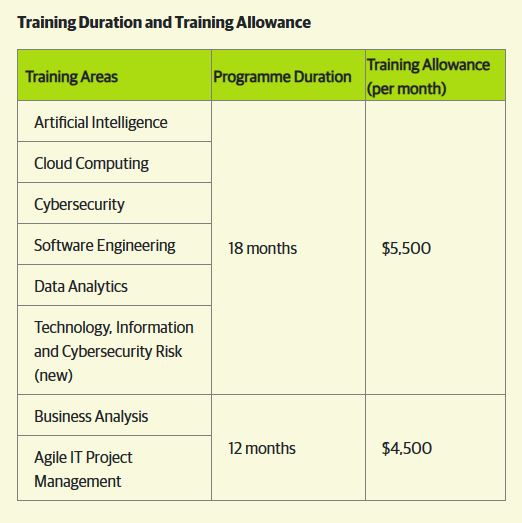TFIP 2023 is over. Offers have been sent out and training will start in February 2024. As with all cases, only a handful succeeded in getting a placement in the programme. We do not know yet whether there will be a TFIP 2024, but it never hurts to prepare early. With all that preparation done, even if there is no TFIP 2024, we can still make use of what we have learnt in other places.
I have covered the technicals and context of TFIP in the TFIP 2023 post, which one should read first. For TFIP 2024 I will cover the non-technical aspects and what we should look out for.
Academic Qualifications For TFIP 2024
TFIP will take in applicants with 0 experience. But that does not mean they will take in someone with 0 knowledge. For a start, having a relevant background such as a degree in Computer Science or Mathematics (Statistics) will give you an added advantage. But whether you have it or not, you certainly can do something to boost your chances, such as getting a related certification. For example, if you are going into the data analytics track of TFIP, you could go get a Google Data Analytics Professional Certificate via Coursera.

The course content itself contains a lot of fluff, but the Google certification is recognised by many. The most important thing is, on top of getting this certificate, one better knows how to use and apply the skills to a certain extent. This is not like school examinations, where after you complete a syllabus you can forget everything. You will really need to know how to use the skills or its alternatives well such as SQL, Tableau (or Power BI), R or Python. Because companies will not want to waste time training you. Although there is the academic training section in TFIP and the on-job-training portion, companies ultimately want a ready-made staff to quickly jump in to get the work done with minimal guidance.
Portfolio
Your portfolio is the most concrete way of proving that you know what you claimed. During your learning, you can begin to do small projects. After learning your skills to a certain extent, you could think of what how to apply your skills to your needs. For example, I do a bit of trading in my day to day life. After learning Power BI, I made use of the skills to process and visualise the data to help me make informed decisions. Whether it really made me a better trader or not is another topic, but applying what I have learnt practically will give my portfolio an added boost.
Link to my above example here. But ignore the portion in the article where I said I am selling the data. I have already scrapped that.
But the best thing is if you could apply your skills to real life work requirements. Look around your existing company if you are working in one. Are there any projects, big or small, which you could participate in and help your boss? See if you can identify any potential opportunities, and talk to your boss about it. Your boss would probably be happy to give you more work to do, and by taking up the project, you will be doing extra work at home. But treat it as learning. You are learning at home after work hours anyway. But with this, you can showcase that you are indeed applying your skills on real world organisational needs rather than some fluffy self-thought up projects. In the event that you fail to get into TFIP 2024, you would still have increased your standing and reputation in your current company, or boosted your chances of jumping into other companies outside of the TFIP range.

The Test
Every track in TFIP will start off with a test. It was that way for TFIP 2022 and 2023, and I should not expect any different for TFIP 2024. For the data analytics track and of other tracks, generally it consists of secondary level mathematical questions and logical tests. The data analytics track will also contain some general programming questions. The artificial intelligence track will contain many business related questions.
Only after you pass the test, will your name be submitted to the participating financial institutions (FIs), who will then look at your resumes and decide whether to give you an interview or not. So if you are going to apply for TFIP 2024, minimally ensure that your Secondary 2 Mathematics are up to standard.

The Selection Process
This is what happened for the TFIP 2023 batch: During the first round, participating FIs will send out interview invitations to candidates of their choice. During this period, a candidate may get invited by a few FIs, and many may not receive a single invitation at all. Take note that each participating FI may have 2 or even 3 rounds of interviews for a suitable candidate, which may include further tests on your technical knowledge. You cannot smoke your way out of a programming question. At the end of this period, all the FIs will send out their offers to the candidates via the Institute of Banking and Finance (IBF), the organisation which coordinates this whole thing.
Selected candidates will then decide which FI they want to join if they have more than 1 offer, or reject the offer(s) if they are not interested in joining the company. Once this period closes, candidates who have taken up the offers will then be eliminated from the candidate pool. The second round will start for the remaining candidates, which is basically a repeat of whatever was described above. For TFIP 2023, there were 3 rounds of selection.

The Reality
TFIP was started with good intentions to increase the capabilities of the Singaporean workforce. That is also why the Government grants a subsidy of 70% of a candidate’s allowance. Note that during this TFIP period, a candidate is paid a sum of money called allowance instead of salary. This allowance does not contribute to CPF (Singapore’s compulsory retirement savings scheme), neither is it taxable. But this also means that your salary is 0 and it may affect certain things like mortgage loan and credit card applications. However, capitalism always have the means to abuse something with good intentions. And the way these FIs abuse it is treating you as a cheap slave labour.

Consider that the allowance for a candidate is $5500 per month. With the Government paying 70% of it, the FIs only need to pay $1650 (without CPF contribution and bonuses) to a degree holder (many selected candidates are Masters or even PhD holders). This is certainly a very cheap cost to pay for an educated white-collared staff. Certain less ethical FIs mass recruit candidates, squeeze them dry by loading them up with much work and making them do over time, then at the end of the training programme select only the cream of the crop to continue as permanent staff while sacking the rest of them. There are also others where the FIs simply have the candidate do other non-related jobs during their training as they just want a very cheap general administrative worker. These groups of people are often left to die on their own after the end of the whole training programme, and the FIs will continue the next cycle of exploitation on a new batch of trainees.

This is why certain FIs have a bad reputation and why candidates would opt to reject them even when given an offer. Because they know that they will not be the top and will definitely get sacked in the end. There are then of course others who still chose to accept, and attempted to use the FIs as a stepping board to jump to another company. What to do depends on what your situation is. But regardless, it is good to know what is the reality on the ground so you can make an informed decision.
Conclusion
TFIP has its pros and cons. Do not go in thinking all will be good. Yet do not be intimidated if you do not have the necessary bargaining chips on the interview table. TFIP 2023 just ended, and it will be about a year till TFIP 2024 (if there is one). Start preparing early and prepare well. That way, even if the road to TFIP 2024 is closed, you will be better equipped to take other routes.

Showing 1 - 3 out of 3
Page 1 out of 1
| - | Shop Products | Price | |
|---|---|---|---|
|
|
$99,999.00
|
||
|
|
$1.00
|
||
|
|
Price range: $69.00 through $99.00
|



for starters, avoid DBS as they tend to hire a lot of TFIP batch and let go of them at the end of attachment citing that there are no available headcount. Seen many being let go for the BA, IT PM and DA batches during my time for TFIP 2022 period.
Thanks again for sharing this. Totally agree with your statement. This is so true and commonplace: “Less ethical FIs mass recruit candidates, squeeze them dry by loading them up with much work and making them do over time, then at the end of the training programme select only the 5-10% to continue while sacking the rest of them.” And renew another batch of TFIP.
The problem is that there isn’t a publication available ranking of these unethical FIs. Which new batch or FIs could reference.